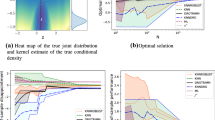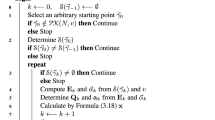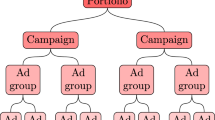Abstract
In an Internet auction, the expected payoff acts as a benchmark of the reasonableness of the price that is paid for the purchased item. Since the number of potential bidders is not observable, the expected payoff is difficult to estimate accurately. We approach this problem by considering the bids as a record and 2-record sequence of the potential bidder’s valuation and using the Extreme Value Theory models to model the tail distribution of the bidder’s valuation and study the expected payoff. Along the discussions for three different cases regarding the extreme value index γ, we show that the observed payoff does not act as an accurate estimation of the expected payoff in all the cases except a subclass of the case γ = 0. Within this subclass and under a second order condition, the observed payoff consistently converges to the expected payoff and the corresponding asymptotic normality holds.
Article PDF
Similar content being viewed by others
Avoid common mistakes on your manuscript.
References
Bajari, P., Hortaçsu, A.: Winner’s curse reserve prices and endogenous entry: empirical insights from eBay auction. RAND J. Econ. 34, 329–355 (2003)
Berred, M.: On record values and the exponent of a distribution with regularly varying upper tail. J. Appl. Probab. 29, 575–586 (1992)
Bradlow, E.T., Park, Y.H.: Bayesian estimation of bid sequences in Internet auctions using a generalized record breking model. Mark. Sci. 26, 218–229 (2007)
Bulow, J.I., Klemperer, P.D.: Auctions vs. negotiations. Am. Econ. Rev. 86, 180–194 (1996)
Caserta, S., de Vries, C.G.: Auctions with numerous bidders. Tinbergen Institute Discussion Paper, 05-031/2 (2005)
de Haan, L.: Slow variation and characterization of domains of attraction. In: de Oliveira, J.T. (ed.) Statistical Extremes and Application, pp. 31–38. Reidel, Dordrecht (1984)
de Haan, L., de Vries, C., Zhou, C.: The extent of Internet auction market. Tinbergen Institute Discussion Paper, 08-041/2 (2008)
de Haan, L., Ferreira, A.: Extreme Value Theory: An Introduction. Springer, New York (2006)
Krishna, V.: Auction Theory. Academic, London (2002)
Laffont, J., Ossard, H., Vuong, Q.: Econometrics of first price auctions. Econometrica 63, 953–980 (1995)
McAfee, R.P., McMillan, J.: Auctions with a stochastic number of bidders. J. Econ. Theory 43, 1–19 (1987)
Paarsch, H.J.: Deciding between the common and private value paradigms in empirical models of auctions. J. Econ. 51, 191–251 (1992)
Papoulis, A.: Probability, Random Variables, and Stochastic Processes, 2nd edn. McGraw-Hill, New York (1984)
Resnick, S.I.: Extreme Values, Regular Variation, and Point Processes. Springer, New York (1987)
Shmueli, G., Russo, R.P., Jank, W.: The barista: a model for bid arrivals in online auctions. Ann. Appl. Statist. 1, 412–441 (2007)
Song, U: Nonparametric estimation of an eBay auction model with an unknown number of bidders. Working paper. http://faculty.arts.ubc.ca/usong/ (2004)
Vickrey, W.: Auctions and bidding games. In: Recent Advances in Game Theory, pp. 15–27. The Princeton University Press, Princeton (1962)
Author information
Authors and Affiliations
Corresponding author
Rights and permissions
Open Access This is an open access article distributed under the terms of the Creative Commons Attribution Noncommercial License (https://creativecommons.org/licenses/by-nc/2.0), which permits any noncommercial use, distribution, and reproduction in any medium, provided the original author(s) and source are credited.
About this article
Cite this article
de Haan, L., de Vries, C.G. & Zhou, C. The expected payoff to Internet auctions. Extremes 12, 219–238 (2009). https://doi.org/10.1007/s10687-008-0077-z
Received:
Revised:
Accepted:
Published:
Issue Date:
DOI: https://doi.org/10.1007/s10687-008-0077-z




